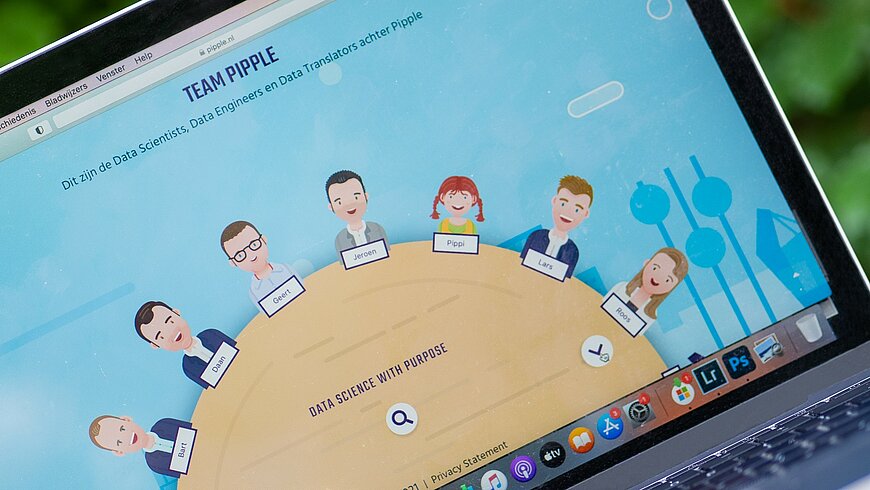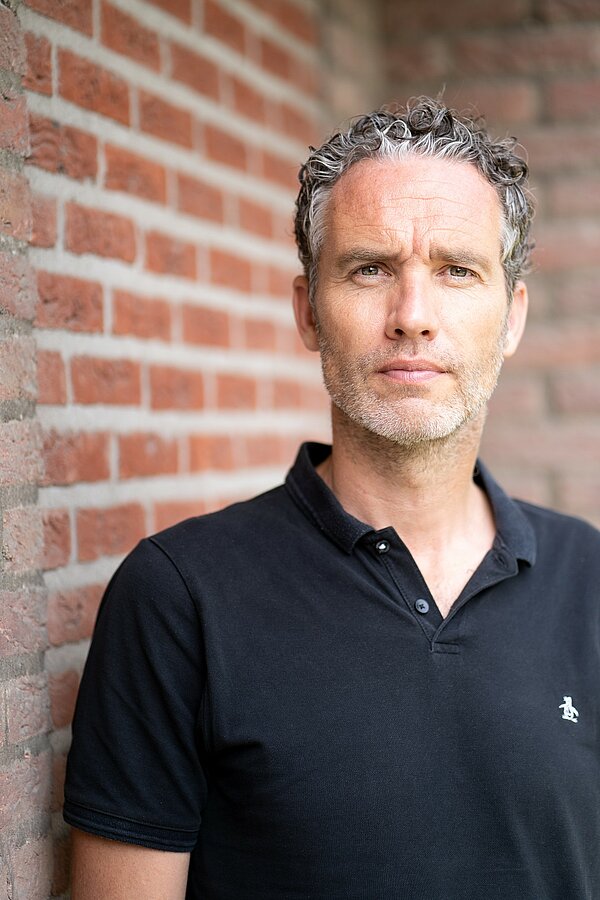Pipple: Beautifying the world with mathematics and creativity
An interview with founder Jeroen de Haas

What does Pipple do?
We use mathematics and creativity to beautify the world. Our name explains just how we do that. The ‘Pi’ in Pipple stands for mathematics. And Pipple is creative, open minded, unafraid, colorful and headstrong. That is why we have incorporated the famous character ‘Pippi (Longstocking)’ in our name. Furthermore, Pipple refers to the three P’s: People, Planet and Profit.
Rhenus Logistics is an example of a company within the logistics sector that we are doing business with. They have a warehouse of 35,000 m2 where tens of thousands of items are being stored and managed by hundred order picking employees. We focus on optimizing the order picking process and are able to predict which orders Rhenus will receive and to allocate the best location for a certain product. Moreover, the pickers have an optimum capacity of how much they can process per hour. For which they need the best selection of boxes to limit the amount of protective filler materials needed. Accurate planning of transportation is also very profitable. Only one way can be the smartest. We develop customized solutions for such processes. Because by carefully reviewing these processes, we can save time and money and reduce emissions.
Another example are solar panels, which, if not carefully maintained, may catch fire. That is why we have developed a system for an insurance company, which uses satellite images to detect who has installed solar panels. Enabling the insurance company to contact potential customers whose solar panels are at risk of catching fire and offer them a maintenance contract. Nobody wants to see their house burn down. Hence, allowing the insurance company to provide service and extra safety.
We have set up a normal business model for Pipple with commercial contracts to gain revenue. But we also offer our knowledge and expertise to NGOs, such as 510/the Netherlands Red Cross and Ocean Cleanup, for free. Malawi, for example, often has to deal with floods. We have developed a system for the Red Cross that detects what material the houses in the flooded areas are made of. Allowing the Red Cross to assess which villages contain the most vulnerable houses so they can accurately prioritize their relief efforts.
In order to enhance our contribution, we, jointly with other companies in the region, have established a foundation called Bits of Help. The purpose of the foundation is to create a portal for NGOs to post their questions with respect to digitization, data and IT. The question will then be allocated to one of the partners. By working together and using our joint expertise, we can help even more NGOs.

Who are you and what is your role within Pipple?
My name is Jeroen de Haas and I am the founder of Pipple. I have studied econometrics and am interested in anything and everything involving mathematics. I was born and raised in Eindhoven and am in a relationship with my childhood sweetheart Catrijn. We have two children.
After graduation, I worked for six months as a teacher in Nepal. I had been back in the Netherlands for quite some time when Nepal was struck by a huge earthquake. One of my Nepalese friends called me and asked if I could come over to help. It was total chaos and we had no idea of the actual impact of the earthquake. I flew to Nepal and with the idea that ‘something is better than nothing’ I brought some cash, clothes and medicine. But I soon realized that my talent for maths was of not much use and that nurses and carpenters were much more needed to help the local population.
After I returned to the Netherlands, I thought of how I could use my gift for maths to contribute to the greater good. Resulting in the foundation of Pipple. Today, we are one of the 250 fastest growing companies in the Netherlands. Pipple is good at predicting, but we can only predict the predictable. Fortunately, life in general continues to surprise us.
In what way are you helping to solve the global challenges?
On a global scale we are only a very small company. Although our company strongly focusses on sustainability, our impact on the collective footprint is rather small. However, we can truly make a difference by helping NGOs do their work in a smarter and more effective way.
Ocean Cleanup specializes in removing plastics from the oceans. In order to do this, they use nets that should float in a specific part of the ocean. However, those nets keep drifting away, after which a tugboat has to put them back into place. We use simulations to model the maximum number of nets to be moved with as few boots as possible.


What impact have you realized by 2030?
By 2030, we have established a community of regional companies to jointly help NGOs improve their digitization process. Pro bono of course. NGOs often lack the resources for digital innovation, while they certainly have the potential to operate more smartly. We want to help improve that digitization process. I therefore hope that by that time we have jointly won the Nobel Prize for Data Science.
What party do you want to jointly realize this ambition with?
AMSL, of course. They are one of the world’s top companies with respect to digitization and innovation. They have so much knowledge and expertise that they would be the ideal partner for Pipple and Bits of Help. It would be great if someone could introduce us to the right person within the company. But there are also other interesting parties within the region that could provide an alternative for the global “usual suspects”. The thing is, we often don’t know of each other’s existence, meaning that great solutions and idea are not widely known within the region. It would be a true asset if we had a party to connect al the dots.
What do you hope the Brainport region has accomplished in 2030 regarding innovation and sustainability?
Eindhoven is one of the smartest regions in the world. We are innovative, high tech and have plenty of talent. I hope that companies such as ASML and VDL and all their regional suppliers remain at the forefront of innovation and sustainability. And I also hope that not only the happy few can benefit from the economic stability resulting from this, but that more thought is given to broader social impact
In order to take care of one another we all have to pay taxes, including large international companies. I don’t like it when companies that make so much profit have set up arrangements to pay little or no taxes. Local social responsibility is part of true entrepreneurship. You can earn a lot of money, but you also have to give back to society. It would be great if that would become a common standard for all entrepreneurs.